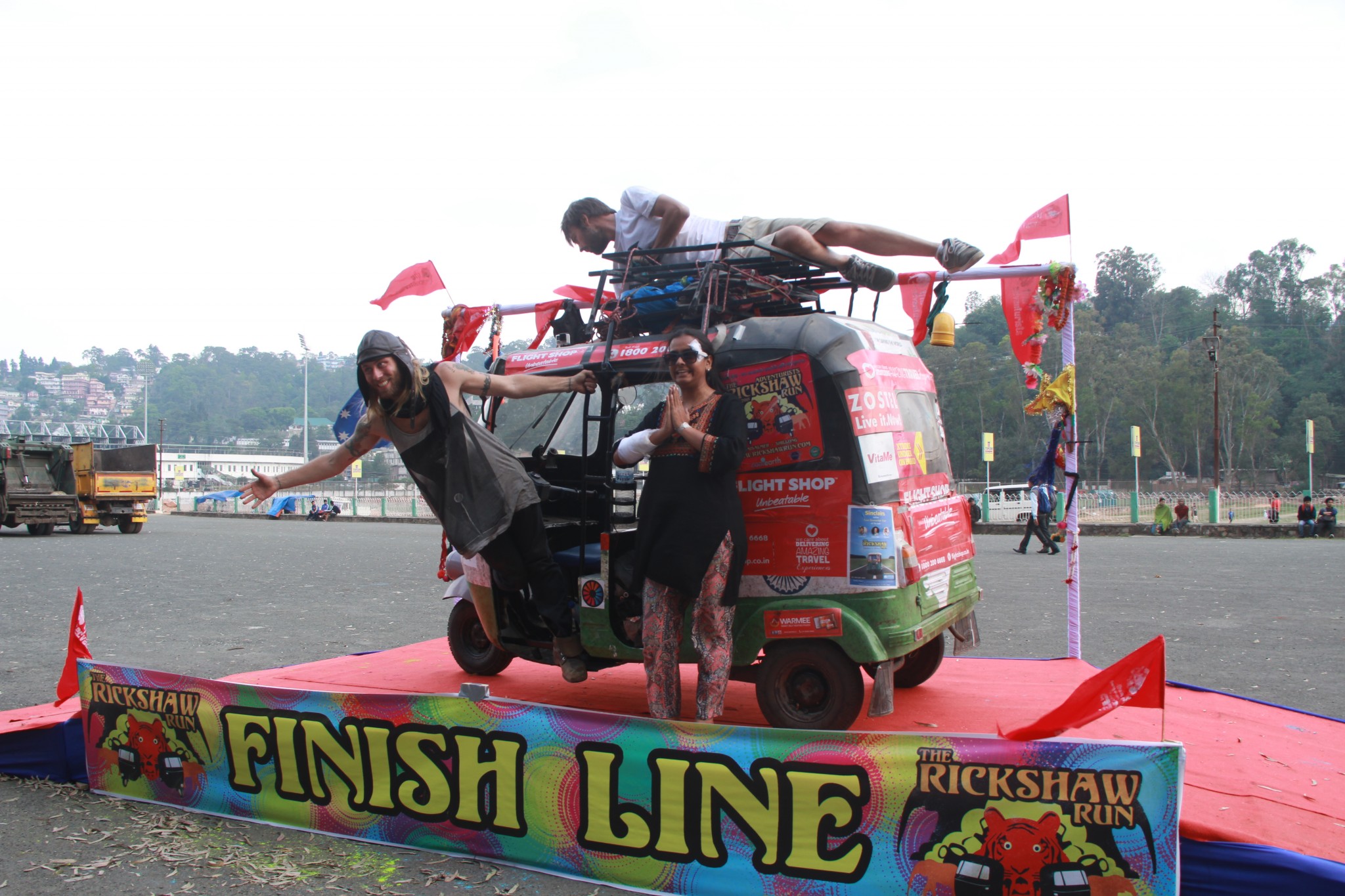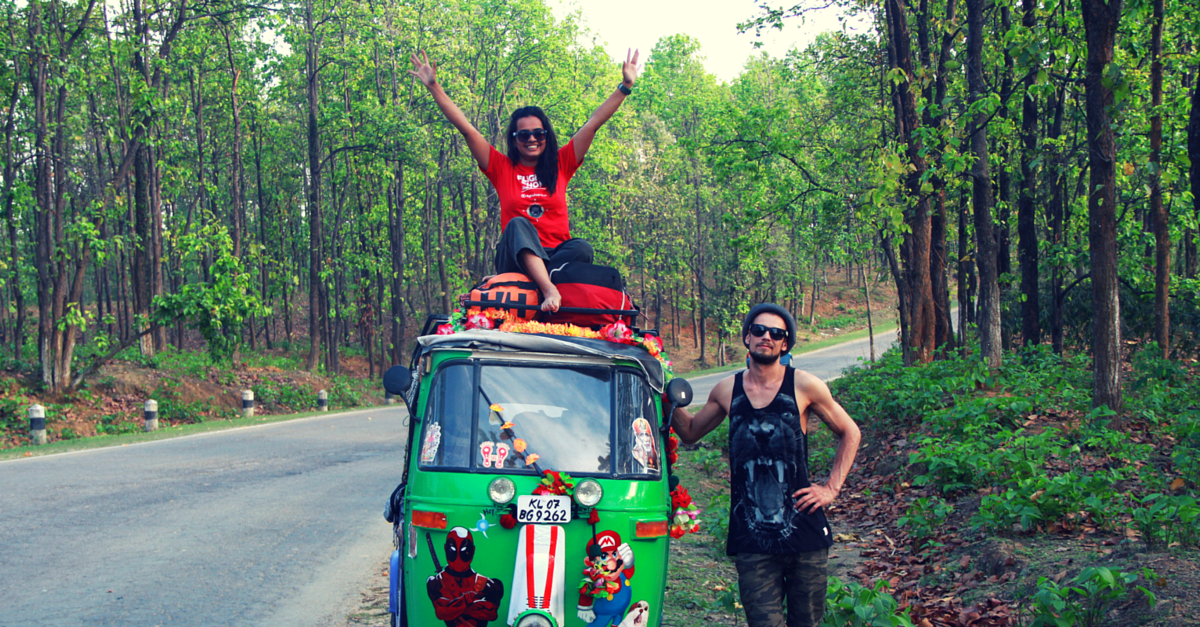Who wants to ride through 17 cities, over 3000 kms, in 2 weeks over bumpy roads in a flimsy vehicle? Only crazy extreme-adventure-sport-loving foreigners, right? Wrong! There’s one daring 29-year-old from Mumbai who also decided to take on the challenge. Meet Rutavi Mehta, just back from her maiden auto rickshaw race, which she finished in only 12 days.
In April, 2015, about 250 people from over 50 countries came down to India to be part of a very unique adventure sport – an auto rickshaw run. The challenge was to drive an auto rickshaw for about 3,000 kms, from Jaisalmer in Rajasthan to Shillong in Meghalaya, covering the breadth of the country in just two weeks — that’s six states and 17 cities. This feat, considered one of the most dangerous adventure sports in the world, had to be accomplished without any backup teams of mechanics, no guidance in terms of directions or any other help, in barely roadworthy vehicles that are certainly not meant to be driven long distance.
Among these 250 people, there was just one Indian participant – Rutavi Mehta.

“I had known about this adventure sport since a long time,” says Rutavi, a travel consultant by profession. “It was in 2007, when a couple of rickshaws had come down to the hotel where I was working as a marketing head earlier…that’s when I came to know about the run.”
At that time though, she hadn’t even dreamt that she would herself participate in the run one day.
Rutavi is from the hospitality industry and has backpacked through Europe in the past. As a travel consultant today, she runs her own company called Photokatha – a place where various travelers from across the country share their travel experiences. She also runs various campaigns with tourism boards of different states as a consultant. Recently, she got a chance to design and head a Kerala Blog Express campaign where 27 international bloggers traveled in different parts of Kerala to experience the culture of the state.
The Rickshaw Run is organized by a UK-based group known as ‘The Adventurists.’ The first run took place in 2006, when the contestants covered the route from Kochi in Kerala to Darjeeling in West Bengal. Since then, the sport is organized with a different route in India every six months, and there has never been a single run in which all the participants have reached the finish line.
There is no prize for winning this difficult race, which is more about giving than getting.
The only necessary requirement for competing is that every team (usually 3 people) should raise a minimum amount of £1000 (USD 1550) for organizations that are working towards the protection of the environment. The two organizations they donated to were Cool Earth and Planeterra. Cool Earth is an environmental charity group working for the protection of rainforests and the local communities living in those areas. Planeterra is also a non-profit organization that helps empower local people to develop their communities and conserve their environment.
Rutavi was very unsure about participating in the race at first.
“A couple of my friends from the travel blogger industry were coming to India and they wanted to be a part of the run. They had already registered for it, but I was not sure,” she remembers.
Being a woman and travelling pan-India was a scary thought to begin with. Moreover, she did not know how to drive a rickshaw. But the sense of adventure, the spirit of charity, and the motivation of friends added up and she got herself registered. “I went out, borrowed a rickshaw and learned how to ride it in a few days.”
Every team in the run has a maximum of three members. Rutavi participated with her friends Derek Freal and Ryan Brown who are travel bloggers from USA — they called themselves Teen Romanchaak Yaar (three adventurous friends). The teams are required to cover a distance of 300 km each day, with one person driving for 100 km at a stretch.
“In a rickshaw, 300 km is like 600 km by car, since the maximum speed is only 55 km/hr, and you don’t have any cushions to support you during the bumpy ride,” says Rutavi.
The race is an expensive one, says Rutavi. The registration fee itself is £2500, a part of which goes directly for charity. In return for the registration amount, they only get the rickshaw. Her team decided to crowd fund this fee, and with the help of friends, family, some corporate organizations and the travelling network created by all three of them, they raised enough for registration as well as for the cause even before the race had started. As for their accommodation, they partnered with different organizations and individuals.
“Since we are travel bloggers, many companies supported us. Zostel (a chain of backpackers’ hostels) came on board as the hospitality partner. In most of the cities we stayed in Zostel and we partnered with similar organizations for our stay and food in other parts,” says Rutavi.
Mountainous terrain, broken roads, unknown paths, and rivers to cross – Rutavi saw it all during the journey.
“I met people from so many countries and got a chance to learn about their cultures. People from Norway, Canada, some countries that I had never even heard about – I learnt how they live, about their culture, food, music, and so much more. There was also a lot of creativity going on around us. Rickshaws were decorated in many unique and brilliant ways,” she says.
But there were some very difficult spots as well. The rickshaw run is considered to be one of the most dangerous adventurous sports by many.
This is because the difficult roads have to be covered on a three wheeler seven horsepower rickshaw, without any support or knowledge about the way, without any back-up or a set route. Rutavi’s team survived two accidents also. One was in Allahabad and the other one in Guwahati, just 150 km before the final destination. But she did not give up and made it to the finish line in spite of some bad injuries.
The one thing that she realised with this journey is that no matter which part of India you are in, people are very helpful. She was amazed to see how the local people turned up to help every time they needed something. If the rickshaw broke down, mechanics would help them without taking any money in return, and people would also offer food at many places. All because they were happy to see a very simple vehicle being used for a charitable cause!
Rutavi says she has travelled to 1500 destinations around the world so far. This enthusiastic wayfarer has spent months exploring Lakshadweep all on her own. She also goes to Ladakh for two months every year where she teaches kids.
Rutavi says that besides getting the thrill of adventure from her rickshaw run, she had one more motive for doing it:
“To empower Indian women with a ‘women can do, and will do’ attitude. People keep saying India is not safe. The aim was to show that women can travel fearlessly in India. It all starts with the realization that they can overcome any fear,” she says.
“My attitude towards rickshaw rides has also changed. Whenever I travel by rickshaws now, I talk to the drivers and tell them about my experience. Many of them can’t believe that I rode a rickshaw for such a long time,” she concludes laughing.
You can contact Rutavi at rutavi@photokatha.in and follow her on Twitter here.
Like this story? Or have something to share? Write to us: contact@thebetterindia.com, or connect with us on Facebook and Twitter (@thebetterindia).
If you found our stories insightful, informative, or even just enjoyable, we invite you to consider making a voluntary payment to support the work we do at The Better India. Your contribution helps us continue producing quality content that educates, inspires, and drives positive change.
Choose one of the payment options below for your contribution-
By paying for the stories you value, you directly contribute to sustaining our efforts focused on making a difference in the world. Together, let's ensure that impactful stories continue to be told and shared, enriching lives and communities alike.
Thank you for your support. Here are some frequently asked questions you might find helpful to know why you are contributing?

